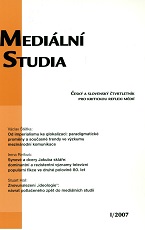Od imperialismu ke glokalizaci: paradigmatické proměny a současné trendy ve výzkumu mezinárodní komunikace
From Imperialism to Glocalization: Paradigmatic Shifts and Contemporary Trends in the International Communication Research
Author(s): Václav ŠtětkaSubject(s): Social Sciences
Published by: Univerzita Karlova v Praze, Fakulta sociálních věd
Keywords: international communication studies; development theory; cultural imperialism; media globalization; reception analysis; glocalization; reverse flow; hybridization
Summary/Abstract: This paper examines and reviews historical development and contemporary trends in the field of international media and communication research. It starts with a brief description of the emergence of this (sub)discipline within the context of the decolonization process after the World War II, which was first reflectedupon by the “communication and development” paradigm. Its rather optimistic view of the media’s role in fostering the economic and social development of the Third World countries was critically challenged at the end of the 1960s, giving prominence to the dependency theories and the related cultural/media imperialism paradigm. After the systematic overview of its underlying assumptions and the work of some of the most important contributors, the paper focuses on the next paradigmatic shift, brought by the rise of the globalization discourse in the 1990s. The author argues that while certain aspects of globalization processes brought an impulse for rejuvenation of both of the older paradigms of international communication, main impact of this discourse can be seen in helping to establish a new approach to the reality of global information/cultural flows and also to its empirical analysis. In this respect, the paper reviews the current trend towards “regionalization” of mediaproduction on a global scale, marked by the rise of powerful media companies in the Third World countries as well as by the “globalization” strategies of the global media industries in search for the local audience. Together with the growing emphasis on the reception analysis of the international media products, questioning popular claims about their homogenizing impact, this approach represents a serious challenge for the theories of Western/American global cultural domination and allows understanding media globalization more in terms of a complex and dynamic process, opening space for an emergence of hybrid cultural forms, product and identities.
Journal: Mediální studia
- Issue Year: 2/2007
- Issue No: 01
- Page Range: 8-33
- Page Count: 26
- Language: Czech

